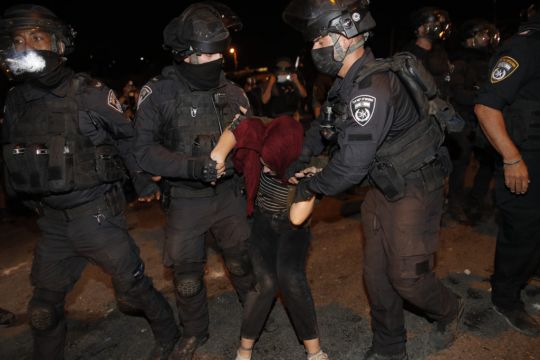Israeli police have clashed with Palestinian protesters outside Jerusalem’s Old City during the holiest night of Ramadan in a show of force that threatened to deepen the holy city’s worst religious unrest in several years.
The clashes come after police blocked busloads of pilgrims headed to Jerusalem for prayer at Islam’s third holiest site.
Police defended their actions as security moves, but these were seen as provocations by Muslims who accuse Israel of threatening their freedom of worship.
Competing claims to east Jerusalem, home to major shrines of Judaism, Islam and Christianity, lie at the heart of the Israeli-Palestinian conflict and have triggered serious violence in the past.

On Friday, Palestinian medics said more than 200 Palestinians were wounded in clashes at the Al-Aqsa mosque compound and elsewhere in Jerusalem.
The violence drew condemnations from Israel’s Arab allies and calls for calm from the US, Europe and the United Nations. The Arab League scheduled an emergency meeting on Monday.
Early on Sunday, the Israeli military said Palestinian militants in the Gaza Strip fired a rocket at the country’s south that fell in an open area.
In response, aircraft struck a military post for Hamas, the militant group ruling the territory. There were no reports of casualties in either attack.
Police chief Koby Shabtai said he had deployed more police in Jerusalem following Friday night’s clashes, which left 18 police officers wounded.
After weeks of nightly violence, Israelis and Palestinians were bracing for more conflict in the coming days.
Mr Shabtai said: “The right to demonstrate will be respected but public disturbances will be met with force and zero tolerance. I call on everyone to act responsibly and with restraint.”
Saturday night was Laylat al-Qadr, or the Night of Destiny, the most sacred in the Muslim holy month of Ramadan.

Islamic authorities estimated 90,000 people gathered for nighttime prayers at Al-Aqsa, the third-holiest site in Islam.
A large crowd of protesters chanted “God is great” outside the Old City’s Damascus Gate, and some pelted police with rocks and water bottles.
Police patrols fired stun grenades as they moved through the area, and a police truck periodically fired a water cannon.
Palestinian medics said 64 Palestinians were wounded, mostly by rubber bullets, stun grenades or beatings, among them a woman whose face was bloodied. Eleven people were hospitalised, medics added.
Earlier, police reported clashes in the Old City, near Al-Aqsa, and in the nearby east Jerusalem neighbourhood of Sheikh Jarrah, where dozens of Palestinians are fighting attempts by Israeli settlers to evict them from their homes.
Police reported several arrests, and said one officer was struck in the face with a rock.
Earlier on Saturday, police stopped a convoy of buses that were filled with Arab citizens on the main highway heading to Jerusalem for Ramadan prayers.
Israel’s public broadcaster Kan said police stopped the buses for a security check.
Muslims fast from dawn to dusk during Ramadan, and travellers, upset that they were stopped without explanation on a hot day, exited the buses and blocked the highway in protest. The road was reopened several hours later.
Ibtasam Maraana, an Arab member of parliament, accused police of a “terrible attack” on freedom of religion.

She wrote on Twitter: “Police: Remember that they are citizens, not enemies.”
The current wave of protests broke out at the beginning of Ramadan three weeks ago when Israel restricted gatherings at a popular meeting spot outside Jerusalem’s Old City.
Israel removed the restrictions, briefly calming the situation, but protests have reignited in recent days over the threatened evictions in east Jerusalem, which is claimed by both sides in their decades-old conflict.
On Sunday evening, Jewish Israelis begin marking Jerusalem Day, a national holiday in which Israel celebrates its annexation of east Jerusalem.
On Monday, an Israeli court is expected to issue a verdict on the planned evictions in Sheikh Jarrah.
The US said it was “deeply concerned” about both the violence and the threatened evictions. The so-called Quartet of Mideast peace makers, which includes the US, European Union, Russia and United Nations, also expressed concern.
Egypt and Jordan, which made peace with Israel decades ago, condemned Israel’s actions, as did the Gulf countries of Bahrain and the United Arab Emirates.
Meanwhile, police have given the go-ahead to the annual Jerusalem Day parade, a flag-waving display of Israeli claims to all of the contested city, despite the unrest and soaring Israeli-Palestinian tensions.
Monday’s parade will pass through Jerusalem’s Old City, part of east Jerusalem, which was captured and annexed by Israel in 1967.







